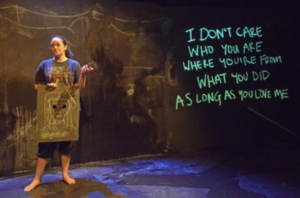By Anya Tate-Manning and Isobel MacKinnon. Zanetti Productions. Riverside Theatres Parramatta. October 11 & 12, 2019.
Reviewed : 11 October, 2019

The stage is bare. The backdrop looks like a chalkboard – because it is! Attached to it are five small slates. One is blank. On the bottom of each of the others the names Ali, Dougal, Tessa and Emma are printed in thick white chalk. They are the characters in the story that Anya Tate-Manning is about to tell.
Barefoot, casually dressed in brown cut-offs and a Backstreet Boys T-shirt (a relevant prop!), Tate-Manning walks casually on to the stage and begins to chat. And that’s the crux of this most unusual and entirely captivating performance. There is no drum roll, no fancy props. Just her laid-back, seemingly unrehearsed manner, the chalkboard and some chalk.
She greets the audience like old friends. Introduces herself. She’s a Kiwi from Dunedin, the southernmost city in New Zealand, cold, very male-oriented, wrapped in a history of whaling and gold, not a very exciting place to grow up. But she and her friends find ways to cope, especially as Ali’s father has a cottage on the hill above his farm.
The story she tells begins in 1998 as they are finishing high school, and takes them to part-time work, further study, the night they decide to bring revolutionary enlightenment to their city, marriage, children … and how they manage when one of them dies. She tells it easily, her sentences running into each other, her speech patterns changing with the tenor of each anecdote.
But first she has to introduce her friends.
As she does so, she takes each slate from the board and offers it – with some chalk – to members of the audience, asking them to sketch the faces as she describes them.. Her descriptions are simple, yet graphic, their personalities illuminated as much by her face as she describes them as the words she uses. This is typical of her performance. Everything is very natural, a little off-hand, funny, uninhibited, and when she describes herself, Anya, self-deprecating.
Whilst the drawings are being completed, she uses another stick of chalk to set the scene. Ali’s cottage on the hill appears, along with sheep and a two-hole drop toilet. Once again, simply, deftly and amusingly described. The drawings of her friends are collected and placed around the cottage – with the addition of another ‘character’, the possum that disturbs their nights.
That being done, Tate-Manning begins her narrative, using chalk to establish the rolling hills above the city and the city itself. This is her set, this, and the sound track of The Backstreet Boys and The Verlaines – and the names of some of the poets the young ‘revolutionaries’ hoped would bring Dunedin into the present.
Humour and pathos walk hand-in-hand in this tale about ordinary people doing ordinary things, sometimes in extra-ordinary ways. Tate-Manning sets a pace that demands to be followed carefully. She uses light to move from one part of the story to another, chalk in hand all the time, in order to exemplify another scene, another moment. A square, filled in with wide sweeps of the chalk becomes a TV screen where a projected segment of Buffy the Vampire Slayer takes her back to the moment her friends call her to begin their ‘rebellion’.
But it is her words, the way she uses them, her almost soft asides, her gentle smile, wide eyes and honest emotion that draw you in – and make the words of Leonard Cohen’s Suzanne a fitting tribute to her performance – And you want to travel with her, and you want to travel blind, And you know that she will trust you …
Congratulations Riverside Theatres for giving your audiences the chance to see this remarkable performance. But what a shame it is only for such a short run.
First published in Stage Whispers magazine